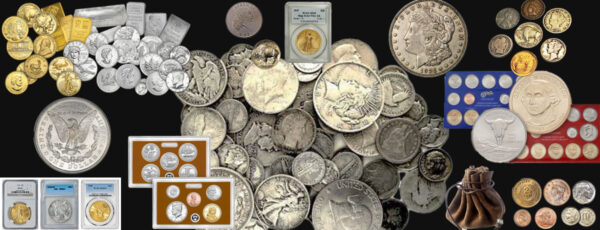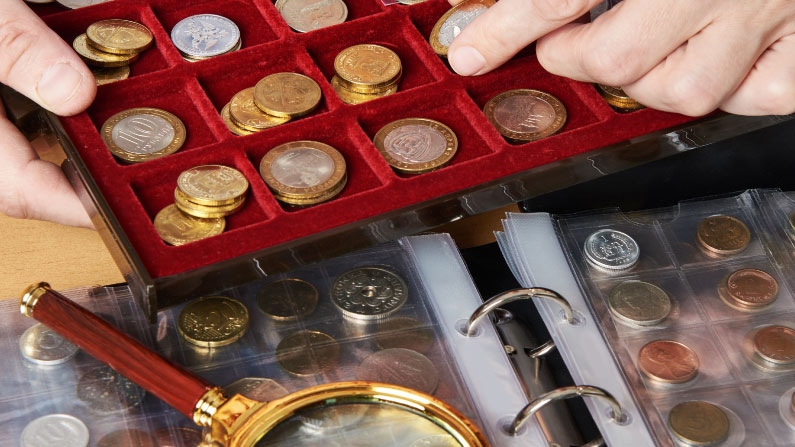
Coin collecting is a very popular hobby that dates as far back as Ancient Rome and truly developed during the Renaissance. In ancient Rome, scholars and state treasuries collected coins, and it has even been said that Roman emperor Augustus would give rare coins as gifts. Coin collecting in the modern sense became popular among the noble classes, including royalty, in the Renaissance period and remained a hobby of the upper classes until the Enlightenment period of the 18th century. During this time, numismatics appeared as an academic discipline and middle-class people began to pursue coin collecting in larger numbers. Today, this “hobby of kings” is still very popular among people from all walks of life.
Coin collecting is an investment as much as a hobby. There are coin collectors willing to spend hundreds of dollars on a single coin, especially if they believe the coin will appreciate in value and give them a return on their investment. If you are interested in coin collecting you may be wondering, can I start my coin collection on a budget? The answer of course is yes as you can gradually build up an impressive coin collection, starting with low grade coins that require a small initial investment. It is a common misconception that coin collecting is an expensive hobby to begin. There are many affordable coins that can be assembled into a valuable collection.
If you are interested in starting a coin collection but you do not want to make a large initial investment, the following tips will help you start coin collecting on a budget.
Choose an Area of Interest
Choosing a specific interest before you begin assembling your coin collection can help you focus when it comes to the pursuit. Decide if you want to collect coins, paper money, rare coins, U.S. coins, or foreign coins. You can also refine your focus by targeting specific denominations or editions of currency. Many collectors also seek out coins made of certain materials such as gold, silver, copper, or nickel. If you are starting your coin collection with a limited budget, you should start with a less expensive area of interest such as classic U.S. coins. You can always change your area of interest as your coin collection grows and you become willing to spend more to acquire new additions.
Set your Budget
Before buying any coins for your collection, make sure you set your budget. You should plan a short-term budget, such as how much you are willing to spend in one year to grow your collection, as well as a long-term budget, such as how much you are willing to spend annually as your coin collection grows. Think of your annual budget as a minimum that can increase if you become more interested in coin collecting or experience an improvement in your financial situation.
When planning your budget, consider the costs of accessories such as holders or display albums. You can also join coin collecting clubs that help you stay within budget by offering coin series with affordable monthly payments.
Research Coin Collecting
Just like with any hobby, it is not a good idea to dive into coin collecting without knowing the very basics about coins. Fortunately, there are many publications available to help new collectors learn about different coin series, dates, types of coins, mintmarks, and the making of coins. One popular publication is the Red book which is a guide for U.S. coins that is published each year. Some experts suggest finding old versions of Redbooks, which can give new collectors an understanding of how coins can appreciate in value over time.
A trove of information can be found on the internet about coin collecting, but you have to be careful to avoid misleading information. Check for information on the websites of reputable organizations such as the Professional Coin Grading Service (PCGS) and Numismatic Guaranty Corporation (NGC). Trusted coin dealers may also provide useful resources for coin collectors online. Spending some time reading over educational materials about coin collecting on the internet will give you a much clearer idea of the basics without spending anything.
Consider Grading
The grading of a coin factors the current condition the coin is in, compared to its condition when the coin was new. Coins with higher grades are closer to mint condition and exhibit more of the original detail, color and finish. The higher the grade of the coin translates to a higher value. Start your collection by purchasing lower grade coins at affordable prices. This way you can start to build your collection without spending too much initially, and you can decide if coin collecting is the hobby for you before spending more on higher grade coins.
Choosing Coins to Collect
It is important to be selective when choosing coins to add to your collection. Consider many different coins and do not make any quick decisions. As you become more experienced buying coins, you will develop an eye for quality. The following tips can help new coin collectors select quality coins and stay within their budget:
- Look for visually appealing coins: “Eye appeal” is a characteristic that all coin collectors look for in a coin, regardless of its age, series, or mint mark. Choose visually appealing coins that fit in with the rest of your collection. Dull, faded looking coins have little eye appeal and less value. By sticking to this principle, you will quickly build a visually impressive collection.
- Look for originality. It is best to find coins with their original surfaces and finishes. This means that a silver coin that was in circulation should appear light to medium grey in color. Cleaned or polished coins do not have as much value as coins with their original finish. You should also check coins for scratches and quality issues around the rims of coins.
- Look for quality: For uncirculated coins, striking and eye appeal are extremely important in determining value. For circulated coins, striking only comes into play with higher grade coins. When you start looking into more valuable coins, look for coins that are PCGS or NGC certified. Coins that are certified are much more likely to retain their value than coins with a high asking price but no certification.
Remember to start with visually appealing, yet inexpensive coins to build your collection. As you gain experience picking out these coins, you will get a better understanding of what makes a quality coin as well as what different types of coins can be worth. You can also consult guides that can help you build impressive, valuable coin collections for just dollars a day.
Find a Reputable Coin Dealer
When you are ready to begin looking for coins to build your collection, it is important to find a reputable coin dealer who can help. A trusted coin dealer will not mislead you on prices and actually help you find coins that will be a great fit for your collection and budget. PGS Gold & Coin has been a trusted coin shop in the Chicago suburbs for many years. Coin collectors all over Chicagoland have come to us to buy and sell coins for their collections at fair and honest prices. You can visit one of our Locations, or contact PGS Gold & Coin online to learn more about our selection of gold coins, silver coins, and rare coins.

